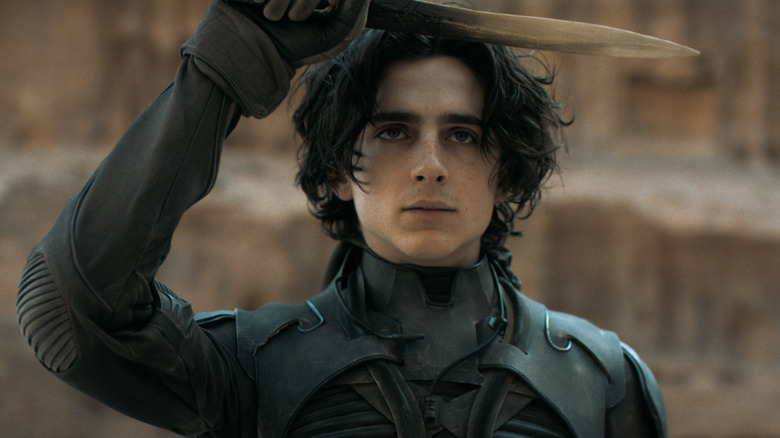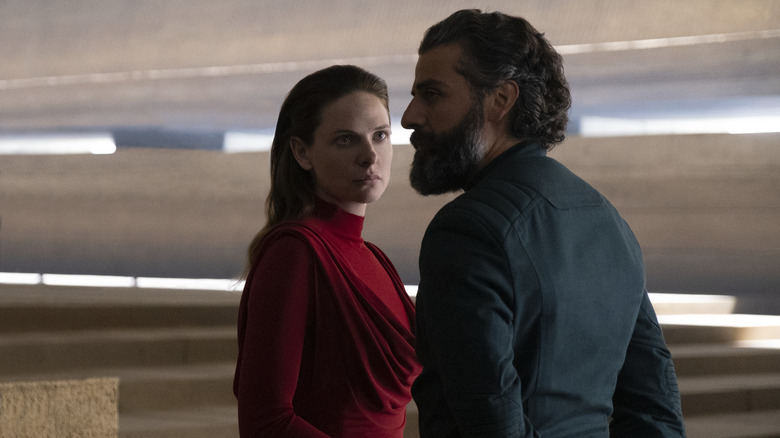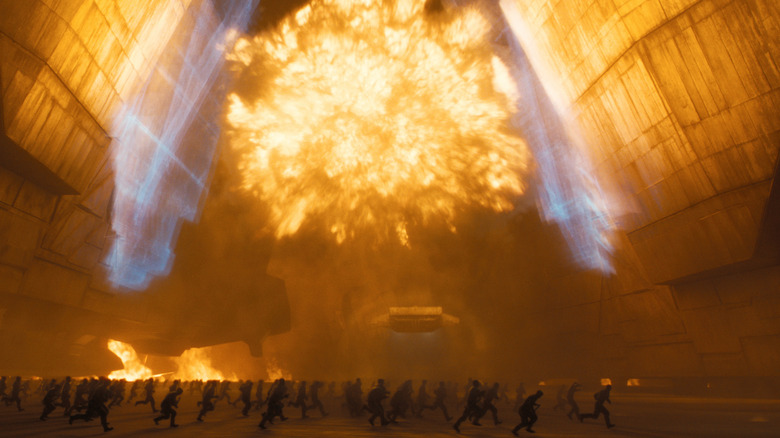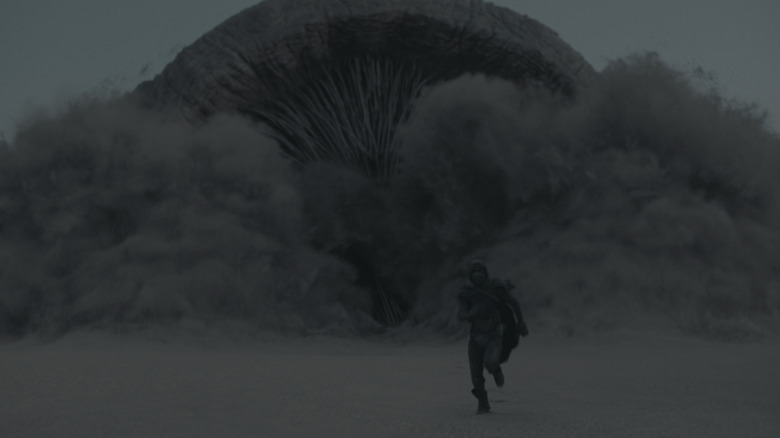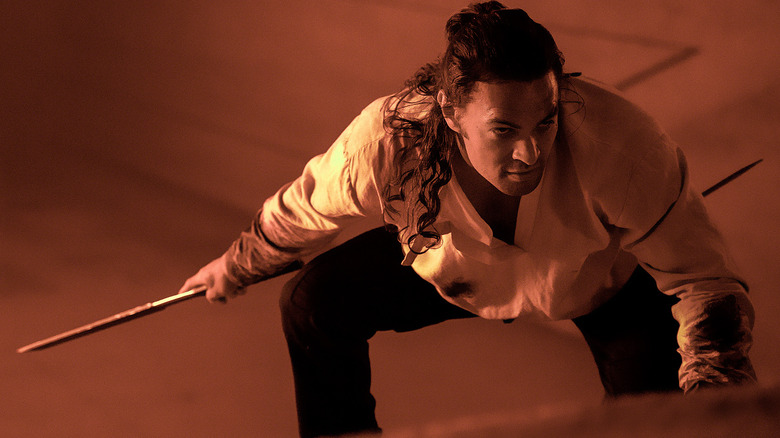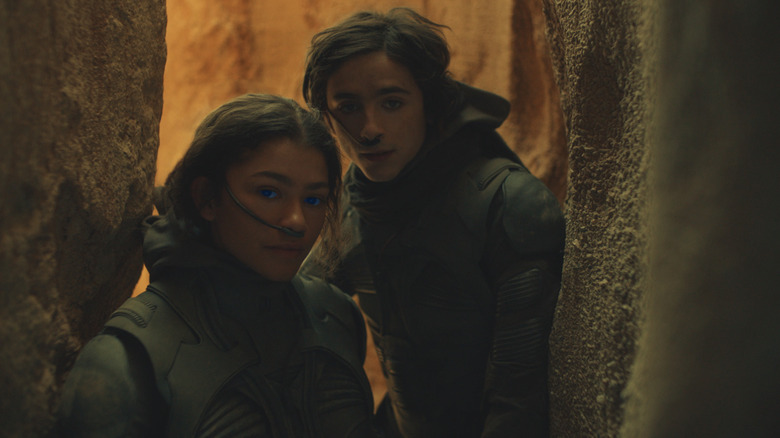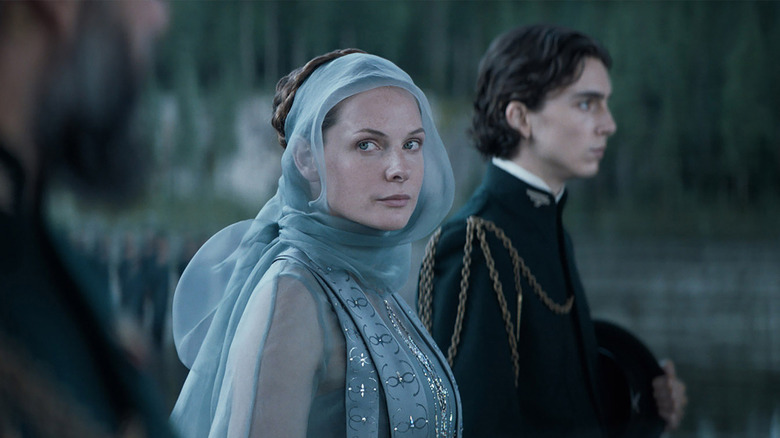Everything You Always Wanted To Know About Dune (But Were Afraid To Ask) [TIFF 2021]
I just witnessed Denis Villeneuve's "Dune" in IMAX at the Toronto International Film Festival, and as I sat bathing in the big, expensive imagery, it occurred to me that some moviegoers are going to have questions going in. Serious questions – questions they'll be asking before they even sit down to watch the movie. If you're one such person, I am here to help you, dear reader. Since "Dune" isn't due out until October 22, 2021, and I don't want to be a huge jerk, I will attempt to keep this as spoiler-free as humanly possible. Still, if you're the type of individual who considers literally any detail or plot element about a movie to be a spoiler, you should probably just go somewhere else. Maybe read our "Dune" review, right here, instead.
What is Dune About?
"Dune" is a massive story. So massive, in fact, that Denis Villeneuve's has split it in half (more on that later). Ultimately, this is a big, epic sci-fi saga about empires, fate, destiny, legacy, spice, sand, giant worms, and mind-control. The principal characters are from House Atreides, a powerful royal family that wields power in the year 10191. Duke Leto Atreides (Oscar Isaac, sporting a really great beard) has just accepted stewardship of desert planet Arrakis, a dangerous world rich in a substance known as spice (it's a vague thing, this spice; thematically, it's meant as a stand-in for Middle-Eastern oil; but in the context of the film it looks like glitter and we're told it has hallucinogenic properties). Previously, Arrakis was in the control of the House Harkonnen, whose members are monstrous and cruel. The Duke, meanwhile, wants to be a benevolent leader (although he also wants to make a profit off all that sweet, sweet spice, of course).
The Duke heads to the planet along with his concubine, Lady Jessica (Rebecca Ferguson), and their son Paul (Timothée Chalamet). Jessica is a member of a mysterious, powerful religious sect known as the Bene Gesserit. As a result of this, she has powers – the power to command people to do her bidding with her voice, for instance. She's been training Paul in these methods as well, and there's a big reason for that: there's a prophecy about a chosen one, and Jessica thinks that chosen one just might be Paul (feel free to think of Millhouse on "The Simpsons" saying "But my mom thinks I'm cool!" right here).
The Duke was handed Arrakis by an all-powerful emperor (who we never see in the movie), but as it turns out, this is all a big rouse; a double-cross to stamp out the Atreides bloodline. Meanwhile, the indigenous people of Arrakis, known as the Fremen, eye everyone and everything with understandable suspicion. They see all these outsiders coming to the planet as colonizers and oppressors, and they're not exactly wrong there. And oh yeah, Arrakis is also home to giant, terrifying sandworms.
That Sounds Complicated. Is Dune Confusing?
Yes, and no. The story itself isn't hard to follow by any means. That said, there's a ton of world-building here, complete with weird words and phrases. On top of that, one of my biggest complaints about the film is that its sound mix is terrible in regards to dialogue. You thought the dialogue in "Tenet" was hard to understand? Folks, you ain't heard nothing yet. Maybe it's just a problem with IMAX and things will work better in non-IMAX theaters, but the screening I saw had such poorly mixed dialogue that I often had no friggin' idea what people were saying. There are numerous scenes where characters spout words of wisdom or mysterious phrases, and it all sounded like mumbled gobbledygook. I'm already planning on rewatching this again, but this time on HBO Max with subtitles so I can finally figure out just what the characters were talking about.
Speaking of HBO Max, Should I Only See Dune on the Big Screen?
Like all other Warner Bros. movies from 2021, "Dune" is headed to both theaters and HBO Max on the same day. Director Denis Villeneuve has been very outspoken against this, stressing that the film needs to be seen on the biggest screen possible and saying:
"Frankly, to watch 'Dune' on a television, the best way I can compare it is to drive a speedboat in your bathtub. For me, it's ridiculous. It's a movie that's made as a tribute for the big-screen experience."
When it comes to the "you MUST see movies in theaters!" argument right now, I get a little uneasy. We are still in the midst of a pandemic, and while some may feel safe returning to theaters, others may not. I saw "Dune" at a theater where everyone was deliberately socially distanced with assigned seating that involved every other seat remaining empty, so no one was truly sitting next to each other. On top of that, we all had to keep our masks on throughout the whole film. But not everyone is going to have those options.
But having seen "Dune" on a big screen, I will admit it looks pretty damn great projected on the largest screen possible. Villeneuve has a great grasp on the scope here, and he conveys massive structures and landscapes in stunning detail. But if you'd prefer to watch this at home, I personally think it wouldn't be detrimental to the film at all. In fact, it might even help, as you can turn on subtitles (as I mentioned above).
Do I Need to Read the Book First?
While reading Frank Herbert's source novel couldn't hurt, it's not a requirement. I haven't read the book – I've tried multiple times and just couldn't get into it – and yet I still enjoyed the movie for what it was, for the most part. While some of the terminologies are a bit confusing, and the connections certain characters have are vague and likely more detailed in the novel, you absolutely can go into "Dune" without having read a single word Herbert wrote.
So, Is This Like Star Wars?
While there are many elements similar to "Star Wars" here – desert planets; evil emperors; a young chosen one; and so on – "Dune" is not really like "Star Wars" at all. Despite their similarities, and both existing in the sci-fi genre, "Dune" doesn't have any of the old pulpy movie serial fun of the "Star Wars" series. One of the biggest complaints levied against Villeneuve is that he's utterly humorless as a filmmaker, and anyone who has that opinion won't be changing their tune after they see "Dune" (although there are a few amusing moments here and there).
"Dune" is more akin to "The Lord of the Rings" in that it's a sprawling epic full of intricate, highly-detailed world-building. That said, it doesn't have the same sense of adventure as "Lord of the Rings." The closest comparison, at least in terms of popular culture, might be "Game of Thrones." Like the HBO fantasy series, "Dune" is about palace intrigue, warring houses, backstabbers, and politics. It also shares the overall bleak, often hopeless tone that "Game of Thrones" had. Then again, it also has a character named Duncan Idaho, which is pretty funny, all things considered.
Is Dune As Good As People Are Saying?
When "Dune" premiered at the Venice Film Festival this month it scored a plethora of rave reviews. I even saw someone on old Twitter Dot Com call it a game-changer. Allow me to be a wet blanket! Well, okay, not a wet blanket, maybe a slightly damp blanket. "Dune" is often stunning, loaded with massive imagery that will awe you at times. The world-building is off the charts, and everything has a genuine ancient, lived-in feel to it. You buy fully into this world.
The cast, for the most part, is solid (but don't expect too much Zendaya; she spends most of the movie silently popping up in dream sequences). But "Dune" is also a cold movie. There's almost no joy to be had. I'm not saying this needed to be a fun, laugh-a-minute romp. But it's nice to have a sense of wonder to go along with all that spectacle, and I didn't get that here. But that's not an entirely bad thing. There's a genuine ominous, overwhelming atmosphere to the whole movie. The first scene with a sandworm is downright terrifying to the point that it made me a little anxious, and that's impressive.
Still, there's more to love about "Dune" than hate. Villeneuve's direction is assured, the special effects look pretty damn flawless, Oscar Isaac and Rebecca Ferguson make for some hot space parents, and Hans Zimmer's score is immense – one of my favorite soundtracks of the year, in fact.
Will There Be a Sequel?
Denis Villeneuve always planned to make two "Dune" movies, and when this film starts, the title card doesn't just say "Dune," it says "Dune: Part One." But here's the problem: no sequel has been given the greenlight yet.
The filmmaker said he's ready to jump right into a sequel and make it fast, stating:
"When you make a movie in two parts, necessarily, when you do the first part you have to know what you're going to do in the second part. So I will say that I will be very ready to go quite quickly."
But Warner Bros. hasn't given him the go-ahead yet, and likely won't until the box office returns come in. And this concerns me, primarily because "Dune" doesn't really have an ending. It simply concludes in an extremely open-ended fashion, more so even than the open-ended ending of "The Lord of the Rings: The Fellowship of the Ring." As such, it doesn't feel like a complete movie – it feels like only part of one.
Warner Bros. took a similar approach with the "It" films, as the first "It" ended with a title card calling the movie "It: Chapter One." But that first film still had its own decisive conclusion – the Losers' Club beat Pennywise – so much so that if WB hadn't ordered "It: Chapter Two," the story would still feel complete. If "Dune" bombs at the box office, and no sequel is made, it'll be like starting a good book only to discover the last 100 pages have been torn out. And that would be disappointing. So, uh, fingers crossed, I guess.
